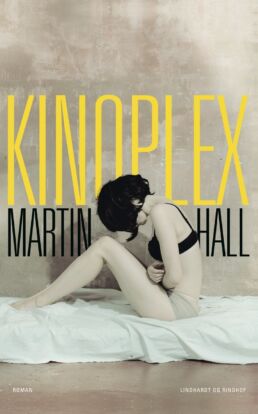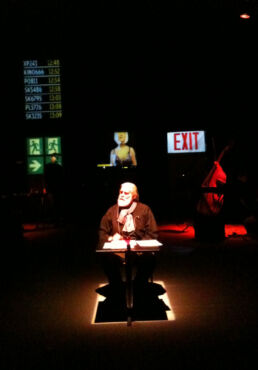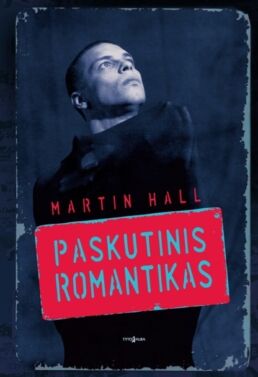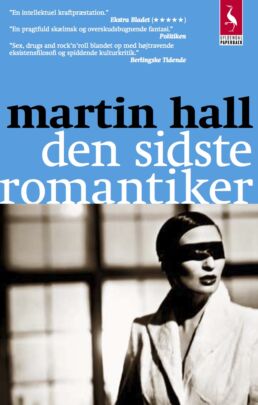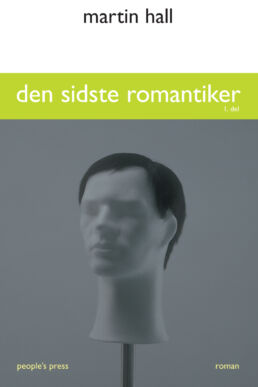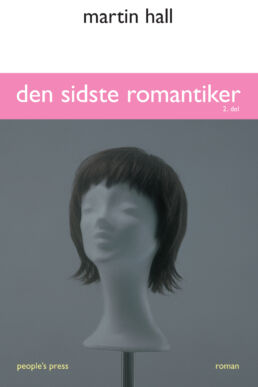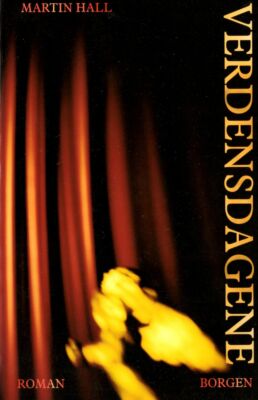NOVEL
KINOPLEX
KINOPLEX
MARTIN HALL
NOVEL
SEPTEMBER 2010
LINDHARDT OG RINGHOF (ISBN 978-87-1142650-0)
Kinoplex was Martin Hall’s first piece of fiction since his literary breakthrough with The Last Romantic released in August 2005. The title was also made available as an audiobook, a recording featuring a line of new music written by Hall and Danish visual artist Christian Skeel.
In comparison to its predecessor Kinoplex is a darker, more plot-driven novel. The scenes in the book take place at two levels, the first being told from the narrator’s present point of view (24 hours on location in a foreign land), the second enacted as a set of flashbacks shedding light on a story that goes back more 20 years in time.
The book is a tale about the disintegration of identity. It’s a story of voyeurism and modern visual culture – how the constant flux of visuals and excessive image manipulation of everyday life affect us. The question throughout the book remains: What are the consequences of this epidemic spread of visuals in relation to our ability to navigate sanely through our lives?
Genre: Novel
Pages: 203
Design: Kenneth Schultz
Photo: Territorium
"Not even when I stepped out of the cool shadows of the airport could I say with certainty what it was I had traveled so many miles after."
“In many ways the most important book in his literary career.”
Berlingske Tidende (the Danish equivalent to The Times)
“Martin Hall’s new novel is an intelligent analysis of modern voyeurism and its consequences. The story is psychologically interesting because it enacts the void that’s left when all excesses have been staged and experienced.“
( * * * * * )
Nordjyske (major regional newspaper)
“It is in all ways an intoxicating book Martin Hall has written … a sensuous language combined with a string of pearls of good, original observations.“
( * * * * )
Fyens Stiftstidende (major regional newspaper)
”Martin Hall has a quite fantastic sense of turning the written language into harmony and you can only surrender to Hall’s linguistic shrewdness and mystical travels into the various intoxications and splendours about all and everything.”
( * * * * )
MetroXpress (Denmark’s biggest free newspaper)
“A novel about a depraved, depressed and disillusioned environment delivered in the most beautiful language … my God, this is good!“
The Literature Site
The novel is supposedly said to have been inspired by an authentic video footage that Martin Hall found on the internet during his research on the subject matter. During the process of writing the book Martin Hall was awarded a grant from The Danish Arts Council.
As already stated the title was also released as an audiobook with its own original soundtrack. Parts of the manuscript also served as basis for an audiovisual stage play that was performed during the autumn of 2010. In November the book was chosen as ”book of the month” at the Main Library of Copenhagen.
- See the reconstructed video footage from the original trailer at www.kinoplex.org
- See recitation from the theatre performance
Herbert Zeichner at the “Kinoplex” theatrical performance at Københavns Musikteater (Copenhagen’s Music Theatre).
PASKUTINIS ROMANTIKAS
PASKUTINIS ROMANTIKAS
MARTIN HALL
NOVEL
OCTOBER 2008
TYTO ALBA (ISBN 978-9986-16-651-1)
Martin Hall’s epic novel The Last Romantic received massive attention by the Danish media and press corpse at the time of its release in August 2005. The book – a two-volume thick publication covering more than 700 pages – became Hall’s literary breakthrough in his home country.
In October 2008 the Lithuanian publishing company Tyto Alba released the title in the former Soviet republic under the title Paskutinis Romantikas (“The Last Romantics”). The company releases approximately 100 books a year and had earlier published translations of bestsellers such as Ms. Smilla’s Sense of Snow by Peter Hoeg, Sophie’s World by Jostein Gaarder and Foucault’s Pendulum by Umberto Eco.
Neither Hall nor his Danish publishing company had anything to do with the choice of the Lithuanian cover. You can read more about the original version here:
THE LAST ROMANTIC
THE LAST ROMANTIC
MARTIN HALL
TWO-VOLUME NOVEL
JUNE 2006
GYLDENDAL (ISBN 87-02-04955-4)
At the end of June 2006 Gyldendal, the biggest Danish publishing house, released Martin Hall’s epic two-volume novel The Last Romantic in its first paperback edition. Originally People’s Press had released the hardback novel in August 2005.
Gyldendal’s paperback version of the book became The Danish Booksellers Association’s ”book of the month” throughout July and August 2006 thereby securing the title its status as a regular bestseller. As a hardback novel the book had already sold several editions.
The Last Romantic has been translated into German and Lithuanian. It remains Martin Hall’s most read book and continues to cause controversy due to its roman à clef status.
The paperback version presented the book with a new cover design based on a photograph taken by Robin Skjoldborg. You can read more about the original version of the book here:
Genre: Novel
Pages: 705
Design: Kenneth Schultz
Photo: Robin Skjoldborg
“It was the summer of 1980. I was 18 years old, 1,82 tall and about 73 kg heavy. When Ronald Reagan was elected President of the United States in November, I was down to about 65. Some might say it was due to all the amphetamine I took, but it was just as much an attitude thing."
”One of the best descriptions of Danish cultural life (or lack of the same) in the last 25 years.”
( * * * * * )
Citadel (the Danish equivalent to i-D)
”A magnificent roguish and excessively rich fantasy … Gripping and amusing, intelligent and, I dare say: edifying.”
Politiken (the Danish equivalent to The Guardian)
”An intellectual feat of strength.”
( * * * * * )
Ekstra Bladet (the Danish equivalent to The Sun)
”Sex, drugs and rock’n’roll mixed with high-flown existential philosophy and a skewering critical angle to modern culture.”
Berlingske Tidende (the Danish equivalent to The Times)
”The best book I’ve read about ”the sons of no generation” as Hall calls them.”
( * * * * * )
Nordjyske Stiftstidende
”Seldomly gripping portrait of the eighties and nineties.”
( * * * * )
Femina
The following passage is taken from the publishers’ foreword to the original edition of the book:
“Throughout human and art history, the romantic struggle is a continuous motif. In the words of Sartre, this is nostalgia for the future – the desire to live life to its fullest, knowing that this will never be realized, and a state of melancholy for the same reason. In Martin Hall’s monumental novel, a gigantic epoch that stretches over 25 years from 1980 to 2005, the storyteller is a young author who matures in the course of the story: From the decadent punk and underground art scenes of the 80’s through the glittering excesses of the 90’s to the level-headedness of the mature man, the question remains; how do you keep your romantic ideals when the world around you doesn’t respond?
The Last Romantic is an extravagant tale about the children of the 80’s, the “sons of no generation” as the author himself has described the iconolaters of this age in a song. It is a novel about zeitgeist and daring, about speed freaks and dandies, dealers, rock’n’roll animals and S/M-parties, all written from the perspective of the particular temper of the times – a complete novel about white nights, the search for spirituality, casual sex, delirious love affairs, crass comedy and philosophy, all gathered in the experiences of a generation, who so far hasn’t had their literary testament written.
More than anything, The Last Romantic is the great novel about becoming a man – at all times.“
”One of the best descriptions of Danish cultural life (or lack of the same) in the last 25 years.”
( * * * * * )
Citadel (the Danish equivalent to i-D)”A magnificent roguish and excessively rich fantasy … Gripping and amusing, intelligent and, I dare say: edifying.”
Politiken (the Danish equivalent to The Guardian)”An intellectual feat of strength.”
( * * * * * )
Ekstra Bladet (the Danish equivalent to The Sun)”Sex, drugs and rock’n’roll mixed with high-flown existential philosophy and a skewering critical angle to modern culture.”
Berlingske Tidende (the Danish equivalent to The Times)”The best book I’ve read about ”the sons of no generation” as Hall calls them.”
( * * * * * )
Nordjyske Stiftstidende”Seldomly gripping portrait of the eighties and nineties.”
( * * * * )
Femina
THE LAST ROMANTIC
THE LAST ROMANTIC
MARTIN HALL
TWO-VOLUME NOVEL
AUGUST 2005
PEOPLE’S PRESS (ISBN 87-91693-09-8)
Martin Hall’s long awaited novel The Last Romantic was released on August 25, 2005, a monumental piece of work divided into two volumes covering more than 700 pages.
The story begins in the summer of 1980 and ends in the autumn of 2005, a time span in which the reader follows the escapades and development of the book’s narrator, 18 years old in 1980, making him one year older than the author himself. It’s a story crashing head-on into the myths and excessive lifestyle of Copenhagen’s bohemian crowd of the period.
It took Hall five years to finish the book and the novel was without a shadow of doubt his most significant literary achievement at the time – a statement substantiated by the fact that he received several grants from The National Fund for the Endowment of The Arts during the process.
Genre: Novel
Pages: 705
Design: Kenneth Schultz
Photo: Casper Sejersen
“It was the summer of 1980. I was 18 years old, 1,82 tall and about 73 kg heavy. When Ronald Reagan was elected President of the United States in November, I was down to about 65. Some might say it was due to all the amphetamine I took, but it was just as much an attitude thing."
”One of the best descriptions of Danish cultural life (or lack of the same) in the last 25 years.”
( * * * * * )
Citadel (the Danish equivalent to i-D)
”A magnificent roguish and excessively rich fantasy … Gripping and amusing, intelligent and, I dare say: edifying.”
Politiken (the Danish equivalent to The Guardian)
”An intellectual feat of strength.”
( * * * * * )
Ekstra Bladet (the Danish equivalent to The Sun)
”Sex, drugs and rock’n’roll mixed with high-flown existential philosophy and a skewering critical angle to modern culture.”
Berlingske Tidende (the Danish equivalent to The Times)
”The best book I’ve read about ”the sons of no generation” as Hall calls them.”
( * * * * * )
Nordjyske Stiftstidende
”Seldomly gripping portrait of the eighties and nineties.”
( * * * * )
Femina
The following passage is taken from the publishers’ foreword to the book:
“Throughout human and art history, the romantic struggle is a continuous motif. In the words of Sartre, this is nostalgia for the future – the desire to live life to its fullest, knowing that this will never be realized, and a state of melancholy for the same reason. In Martin Hall’s monumental novel, a gigantic epoch that stretches over 25 years from 1980 to 2005, the storyteller is a young author who matures in the course of the story: From the decadent punk and underground art scenes of the 80’s through the glittering excesses of the 90’s to the level-headedness of the mature man, the question remains; how do you keep your romantic ideals when the world around you doesn’t respond?
The Last Romantic is an extravagant tale about the children of the 80’s, the “sons of no generation” as the author himself has described the iconolaters of this age in a song. It is a novel about zeitgeist and daring, about speed freaks and dandies, dealers, rock’n’roll animals and S/M-parties, all written from the perspective of the particular temper of the times – a complete novel about white nights, the search for spirituality, casual sex, delirious love affairs, crass comedy and philosophy, all gathered in the experiences of a generation, who so far hasn’t had their literary testament written.
More than anything, The Last Romantic is the great novel about becoming a man – at all times.“
The Last Romantic has been translated into German and Lithuanian. It’s later been released as a paperback edition on Gyldendal, Denmark’s largest publishing house. It remains Martin Hall’s most read book and continues to cause controversy due to its roman à clef status.
”One of the best descriptions of Danish cultural life (or lack of the same) in the last 25 years.”
( * * * * * )
Citadel (the Danish equivalent to i-D)”A magnificent roguish and excessively rich fantasy … Gripping and amusing, intelligent and, I dare say: edifying.”
Politiken (the Danish equivalent to The Guardian)”An intellectual feat of strength.”
( * * * * * )
Ekstra Bladet (the Danish equivalent to The Sun)”Sex, drugs and rock’n’roll mixed with high-flown existential philosophy and a skewering critical angle to modern culture.”
Berlingske Tidende (the Danish equivalent to The Times)”The best book I’ve read about ”the sons of no generation” as Hall calls them.”
( * * * * * )
Nordjyske Stiftstidende”Seldomly gripping portrait of the eighties and nineties.”
( * * * * )
Femina
THE WORLD DAYS
THE WORLD DAYS
MARTIN HALL
NOVEL
MARCH 1996
BORGENS FORLAG (ISBN 87-21-00406-4)
The World Days is Martin Hall’s debut novel. Where his earlier works were characterized by a more obscure and essay-like style of writing, this time the author charged head-on into a burlesque and almost slapstick’ish style and plot. The book is a tongue-in-cheek tale about religious rapture and love, a comedy drama driven by romantic pathos and poetic exuberance.
In general the book was well received by the press. On the cover of the book the following info was given:
”The World Days is a wild and adventurous tale, an absurd farce about friendship and love. The story is enacted in a timeless Europe where myth and reality no longer seems to be separable, neither for the reader nor the involved parties. The title refers to the prophecy of a hundred days where the angels are said to descend from heaven.
The World Days is an epic tale from the great wide open.“

